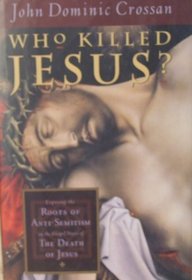Search -
Who Killed Jesus?: Exposing the Roots of Anti-Semitism in the Gospel Story of the Death of Jesus
Who Killed Jesus Exposing the Roots of AntiSemitism in the Gospel Story of the Death of Jesus
Author:
"Anti-Semitism means six-million Jews on Hitler's list but only twelve-hundred Jews on Schindler's list. This book is about anti-Semitism, not, however, in its latest European obscenity, but in its earliest Christian latency. It is about the historicity of the passion of the narratives, those terribly well-known stories abo... more »
Author:
"Anti-Semitism means six-million Jews on Hitler's list but only twelve-hundred Jews on Schindler's list. This book is about anti-Semitism, not, however, in its latest European obscenity, but in its earliest Christian latency. It is about the historicity of the passion of the narratives, those terribly well-known stories abo... more »
ISBN-13: 9780060614799
ISBN-10: 006061479X
Publication Date: 5/1995
Pages: 238
Rating: 3
ISBN-10: 006061479X
Publication Date: 5/1995
Pages: 238
Rating: 3
4.3 stars, based on 3 ratings
Publisher: Harpercollins
Book Type: Hardcover
Other Versions: Paperback
Members Wishing: 0
Reviews: Amazon | Write a Review
Book Type: Hardcover
Other Versions: Paperback
Members Wishing: 0
Reviews: Amazon | Write a Review
Genres:
- Religion & Spirituality >> Authors, A-Z >> ( C ) >> Crossan, John Dominic
- Nonfiction >> Social Sciences >> Discrimination & Racism
- Christian Books & Bibles >> Church History >> General
- Christian Books & Bibles >> Theology >> Christology
- Christian Books & Bibles >> Bible Study & Reference >> Bible Study >> General




